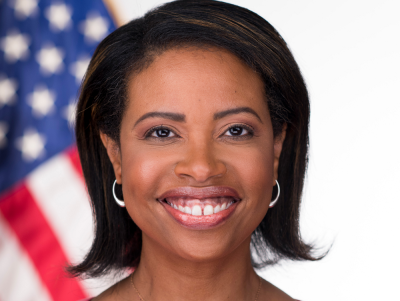LAS VEGAS—Over the last year, the Affordable Care Act's (ACA's) exchanges have seen enrollment skyrocket as enhanced subsidies and pandemic-driven special enrollment periods made plans more accessible than ever.
Enrollment topped 14.5 million earlier this year, a record on the exchanges, and, with the subsidies extended for the next several years, that's a trend that's likely to stay, Centers for Medicare & Medicaid Services (CMS) Administrator Chiquita Brooks-LaSure told Fierce Healthcare in an interview at the HLTH conference.
In addition to the subsidies, CMS and ACA exchange navigators put a focus on improving outreach, and the results are paying off, she said.
"I'm excited about a lot of things as CMS administrator; that's one of the biggest ones, where I feel like we were able to see so much last year about what a difference the increased subsidies made and our efforts on outreach," she said.
Here's more from our conversation:

Fierce Healthcare: We've seen enrollment explode on the ACA exchanges over the past year or so. What do you need to do to sustain that growth and reach more potential enrollees?
Chiquita Brooks-LaSure: At the beginning of the time when the Biden-Harris administration came in, we started with increased outreach and we saw a big bump. And then when the subsidies came in we saw a new bump. I think that we were much more deliberate about reaching out to underserved communities and we really saw it in the data, what a difference that made. And that is one of the things I think is going to help us sustain enrollment moving forward.
And the subsidies have made coverage so much more affordable for people, and I think for different groups. I think for those right above Medicaid, in some states we were seeing something like 20% to 40% of people getting lost. But now that income level right above Medicaid, the coverage is affordable for them to stay in it.
FH: Given the extended subsidies and the family glitch was addressed, it seems likely that this population will remain large. Does that make you then think differently about policy governing the exchanges?
CBL: I would say, yes, we have to continue to think about how it evolves, but I also think it gives more options because it's a really stable population in terms of a healthy market. We've seen more issuers who want to participate, insurance companies. I think we still have more work to do in the sense that there still are states that still haven't expanded Medicaid, so we still have a number of states where we have a significant number of uninsured.
And also, it's extended for three years, so that's not ideal and something that we're going to have to keep working on to make sure people understand what a difference the subsidies are making.
FH: You mention that part of why enrollment was able to grow so much is that you were able to get to these underserved communities more effectively. What resources are necessary to continue that?
CBL: Funding is a big part of that; we've been able to really increase how much money we've given to navigators. It's also making sure we're using messages that are resonating. So we are very focused on our immediate outreach and communicating in ways that are appropriate for different groups. Some families, some individuals respond to messages in different ways, and we need to really be mindful of that. Companies like these know that and we need to incorporate those lessons from the private sector, that you don't use one message to reach a whole host of different types of people.
That's one of the things that we've really tried to do in our marketing: to be more targeted, to make sure that we're using focus groups that really represent the range. Not just focusing on getting one population.
Now that they're stronger, the marketplace market is strong, making sure that we're getting everyone is something we have even more focus on.